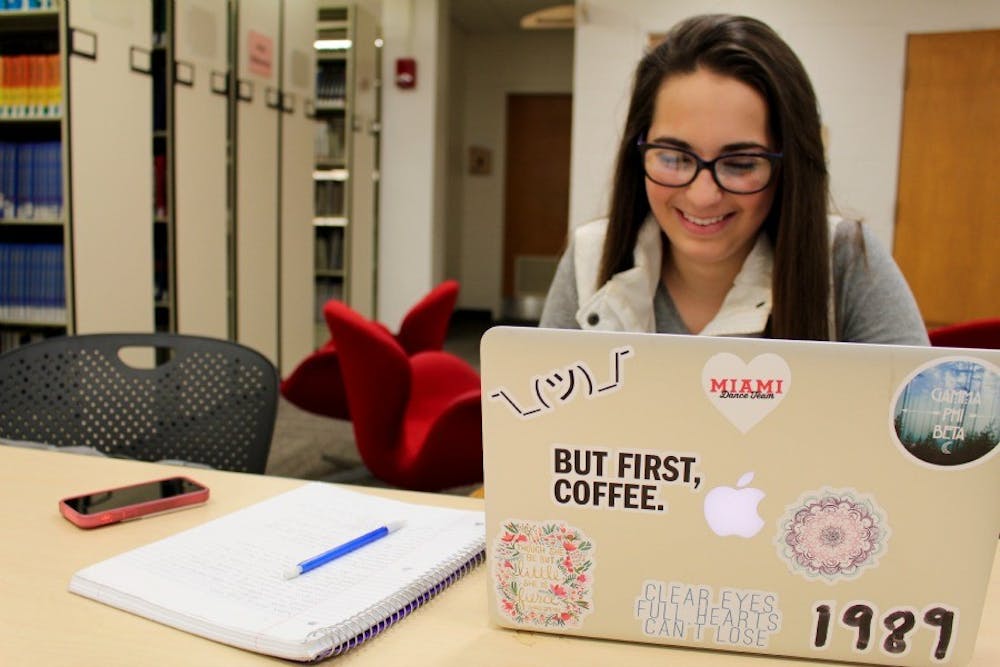By Hannah Jolly, For The Miami Student
Essena O'Neill, Instagram celebrity and model, deleted her social media on Nov. 3, straying from the self-labeled facade she created for her life online. She encourages people to live in the present, not through a screen. Despite this, many students at Miami still remain attached to their digital identities.
According to a report by Common Sense Media, U.S. teens spend nearly nine hours using entertainment media on smartphones and laptops on any given day. Walking around Miami's campus, countless students can be spotted mechanically navigating their way to class, thumbs scrolling across screens.
O'Neill, 19, said her social media usage led her to extreme dieting, spending wasteful hours posing and editing photos and YouTube videos and promoting products without disclosing to her viewers that she was being paid.
Sophomore Antonia Caba is president and chapter leader of I Am That Girl, an organization that encourages self-love, empowerment and the uplifting of women on Miami's campus. She said she believes social media harms Miami students.
"Social media is causing girls to think they should be something they're not, acting, looking and eating a certain way," Caba said. "This can be dangerous because it's forcing girls to think in a way they don't need to be thinking."
In O'Neill's YouTube video, "Why I REALLY am Quitting Social Media," she revealed the untold story behind much of her social media presence. Her Instagram account remained active but the original captions had been edited to reflect the reality behind each image.
Examples of O'Neill's edited captions include, "… took over 100 in similar poses trying to make my stomach look good. Would have hardly eaten that day."
O'Neill has since deleted her account entirely.
O'Neill's actions encouraged and refreshed Miami junior Audrey Bucholtz.
"When girls don't get to see the behind the scenes of the perfect picture, how long it took to take it and how many different poses were used to get just the right one, girls look at it and wonder why they can't look and be like that," Bucholtz said. "They have to remember that you can't compare your behind the scenes blooper reel with someone else's highlight reel."
Another student, sophomore Madison Galdes, agreed.
"I think everything Essena said in her video needed to be said. People live for the moment just to Instagram. People only want to do things if you can get a cute picture. It's like it didn't happen if you didn't Instagram it," Galdes said.
Bucholtz claimed she understood what drove O'Neill's social media infatuation.
"When people who post online get likes, favorites and retweets, it's a form of praise that makes them feel good, like people care about them and find them interesting," she said.
Junior Nikolai Levinsohn, a psychology student with a focus in social media studies and research, thinks social media is changing how people think and feel.
"Social media use affects the amygdala, the emotional processing center of the brain," Levinsohn said. "The psychology of the brain is changing with media use. Relationships are affected as there is a correlation between high levels of social media surveillance and a decrease in the duration of the length of these relationships."
Social media is changing the way relationships are formed and maintained. According to a Pew Research Study, 72 percent of all teens spend time with friends through social media. Of these teens, 57 percent have met a friend online, with 29 percent having met five or more friends online.
Sophomore Julia Harrelson said she feels social media allows people to feel better about themselves.
"Angles and lighting create the pictures you think are so perfect," Harrelson said. "This filtered form of perfection sets an unrealistic expectation of physical beauty. Liking and commenting on Instagram pictures is just fueling insecurity with words of affirmation."
Organizations on Miami's campus have a social media presence. Numerous sororities on Miami's campus have Instagram and Tumblr accounts showcasing photos of their members as marketing material.
"The sorority Instagrams and Tumblrs on campus don't show you photos of their members sitting in chapter wearing leggings, scrolling through their phones. They post pictures of their members all done up at philanthropy events. You don't get the whole story," said Bucholtz.
Caba said that although social media has a negative air around it, some aspects of it can be positive.
"I think overall, I don't want to paint a negative light on social media. Some accounts post positive, inspiring images and if people turned to those posts, we could use social media to it's fullest potential."

